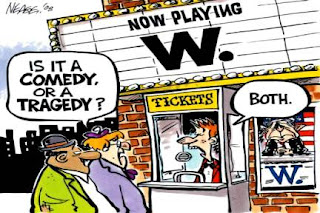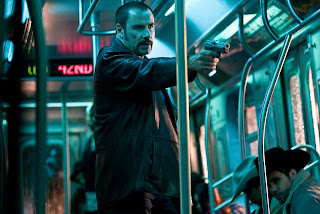A few months ago, I was ready to write off 2009 as one of film's leaner years. I was then swept away by a number of movies that hit me on an intense personal level. This year, more than anything else, film was a revealing reflection of ourselves. It tapped into our fears and desires, our current state of social and economic unrest. Films had real weight and context. "Where the Wild Things Are" wasn't a playful childhood fantasy, but a painfully real depiction of youth. "The Road" wasn't a simple popcorn spectacle, but a haunting vision of the future. These were just a few of the many great films this year.
Now, before some of you start bitching, I haven't seen "Avatar" yet. If it ends up cracking my Top 10, I will revise this list. I just couldn't wait any longer to post this.
Without further ado, I present the Top 10...

1. A Serious Man- Watching this movie was like staring into the abyss and being confronted by my deepest fears. Being a Coen Brothers film, it made me laugh at the same time. Its tale of Larry Gopnik, a man suddenly hit with marital, professional, and moral dilemmas, perfectly captures the frustrating absurdity of life. The film doesn't explain life's madness. It simply, refreshingly, forces you to watch it unfold.
This movie came along at an eerily perfect time in my life, a time in which I was experiencing much stress and hardship. Impending adulthood was beginning to weigh on me. At a time when I kept questioning what was happening to me and those around me, this film taught me to "accept the mystery." It's a difficult, scary lesson, but one well worth learning for all of us.
2. Where the Wild Things Are- If "A Serious Man" mirrors my adulthood, "Where the Wild Things Are" is a reflection of my childhood. I WAS the main character, Max, when I was little: always playing, content to be alone in my world of fantasy and wonder. This film gets everything right about that time in our lives: the desperate longing for play time after school, the magical creatures that are real in your heart, but not in the real world, the loneliness inflicted by the increasingly adult world around you. It's at once beautiful, hopeful, and heartbreaking. This film presents a world you will want to get lost in--a dreamy forest not unlike the forts and tree houses you built in your backyard. It's organic, it's familiar. This is not a cold, lifeless spectacle. It will hit you close to home. Months after seeing it, I'm still floating in its melancholy wonder.
3. The Road- Why did people not talk more about this film when it is such a starkly beautiful, suspenseful, near-masterpiece? Why did no one send crazy fan letters to Viggo Mortensen, praising his deeply-felt performance as a father protecting his son through the apocalypse? Why did no one mention how surprisingly fun this film is, how it is sometimes reminscent of "The Road Warrior" and vintage John Carpenter? For me, this film was the biggest surprise of the year. In lesser hands, it could've been a Michael Bay-esque spectacle. In other words, it could've been like its trailer. In John Hillcoat's hands, it's at once low-key and exciting, and altogether great.
4. Up in the Air

A rare specimen: a film that is at once relevant, timely and timeless. Timely in its depiction of current social and economic unrest, timeless in its portrayal of one man's quest for romance and more importantly, redemption. George Clooney's performance and Jason Reitman's sharp writing and direction make corporate downsizer Ryan Bingham a new classic film character. This movie, like so many others this year, shows how film can be a revealing reflection of the times and ourselves.
5. Funny People- This film is profound in revealing the pain that is masked by the humor of our everyday lives. Most indelible is the scene in which dying comedian, George Burns (Adam Sandler) sees his new doctor. Instead of engulfing George in dread, director Judd Apatow and Sandler have him disregard his doom and poke fun at his doctor's thick German accent. That is a moment of great truth because that is what any of us would do. Like George, we would use humor as a refuge. This film is full of moments like this. It's a comedy that is far more than funny.
6. The Hurt Locker- One of the most brazenly realistic depictions of war in recent memory. In this Iraq War tale, you can feel the heat, taste the desert air. The most interesting part of this film, though, is Jeremy Renner's character, bomb defusal unit leader, Will James. He is the antithesis of a typical screen soldier. Instead of dreading conflict and longing for home, he throws himself into harm's way with almost giddy exuberance.
7. Bruno- To label this movie a biting satire on American intolerance is to shortchange it. Aside from sociopoltical commentary, it's about movie magic, specifically the visceral thrill of watching filmmakers take enormous risks for their art. When Sacha Baron Cohen as Bruno exposes politician Ron Paul's aggressive homophobia by stripping naked in front of him, you will be strangely inspired. It is one of the most punk, inspiringly provocative acts I have ever seen--right up there with the Vietnam protests. Much more so than Michael Moore or Oliver Stone, satirist Sacha Baron Cohen forces us to look at the darkest parts of ourselves. "Bruno" is a dizzying and cathartic comedic spectacle. The humor cuts deep, striking the mind as well as the heart.
8. Fantastic Mr. Fox- Fun, quirky, poignant, otherworldly and human at the same time. In other words, a Wes Anderson film. This movie left me with a smile on my face and a song in my heart. The animation took me back to my glorious childhood days of watching "Wallace & Gromit." What I liked most, though, was the way Mr. Fox fits so perfectly with Wes Anderson's other characters. Like "Bottle Rocket's" Dignan, "Rushmore's" Max Fischer, Royal Tenenbaum, he is a mischievous innocent. Like those characters, he has a childlike sense of wonder of which he cannot let go. Don't we all?
9. Star Trek- Audiences have become so accustomed to CGI wizardry that the magic of movies has been lost on them. "Star Trek" resensitizes audiences to the magic by infusing its spectacles with visceral excitement. The deeply felt performances from Chris Pine and Zachary Quinto elevate the material, turning what could be cheap thrills into harrowing moments. The visceral excitement also comes from the look of the film. J.J. Abrams, in filming outer space, takes on the point of view of an unsuspecting and excited outsider. There is clumsiness to the camerawork that mirrors the same natural, distracted quality any normal person would have when filming something so foreign and awe-inspiring. Like a child, the camera's eye is always wide and glistening.
10. The Informant- It's not the acts of espionage in "The Informant!" that are funny, but the bland, unromantic places in which they occur. When you see "Springfield, IL" pop up urgently in bold, demanding letters across the screen, your first instinct is to laugh. In that sense, director Steven Soderbergh has succeeded. His goal is to deromanticize the corporate thriller genre with a comic spirit, revealing how bureaucratic and "uncool" (for lack of a better term) the business of spying can be. He aims to show you that corporate corruption and espionage are very real and occuring all around you, not only in the exotic locales of James Bond films, but in shabby offices across your city. On top of that, Matt Damon, as real-life corporate whistleblower Mark Whitacre, gives possibly the best and most entertaining performance of his career here.
11. Inglourious Basterds- This might not be Quentin Tarantino's masterpiece, but it is certainly his most tense and suspenseful film. The first scene alone is one of Hitchcockian power. This World War II revenge story is counterprogramming to gritty, harrowing war films like "Saving Private Ryan" and "The Thin Red Line." It plays with history, it pokes fun at the absurdity of war, it pays homage to other films. There is a sometimes off-putting, cold, experimental quality to it, but this film's strengths outweigh its weaknesses.
Honorable Mentions: Moon, An Education, Pirate Radio, Taking Woodstock, Shrink
















